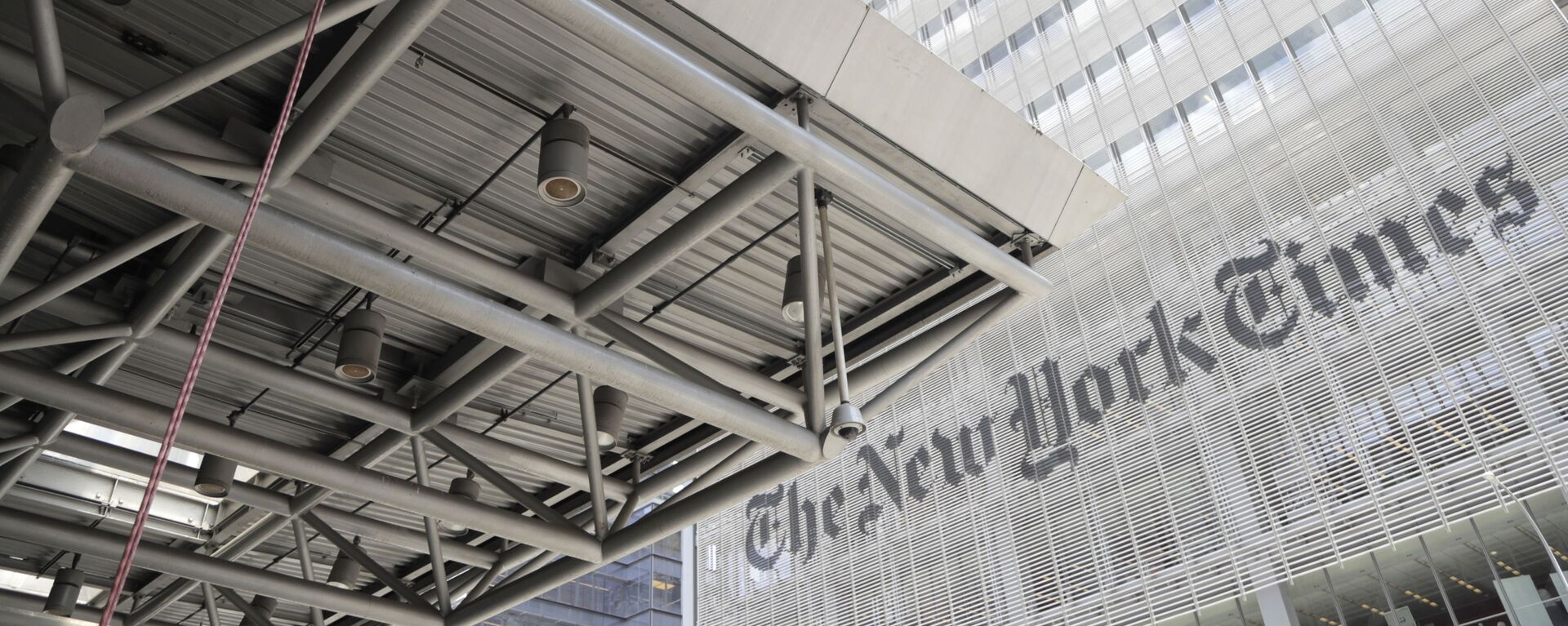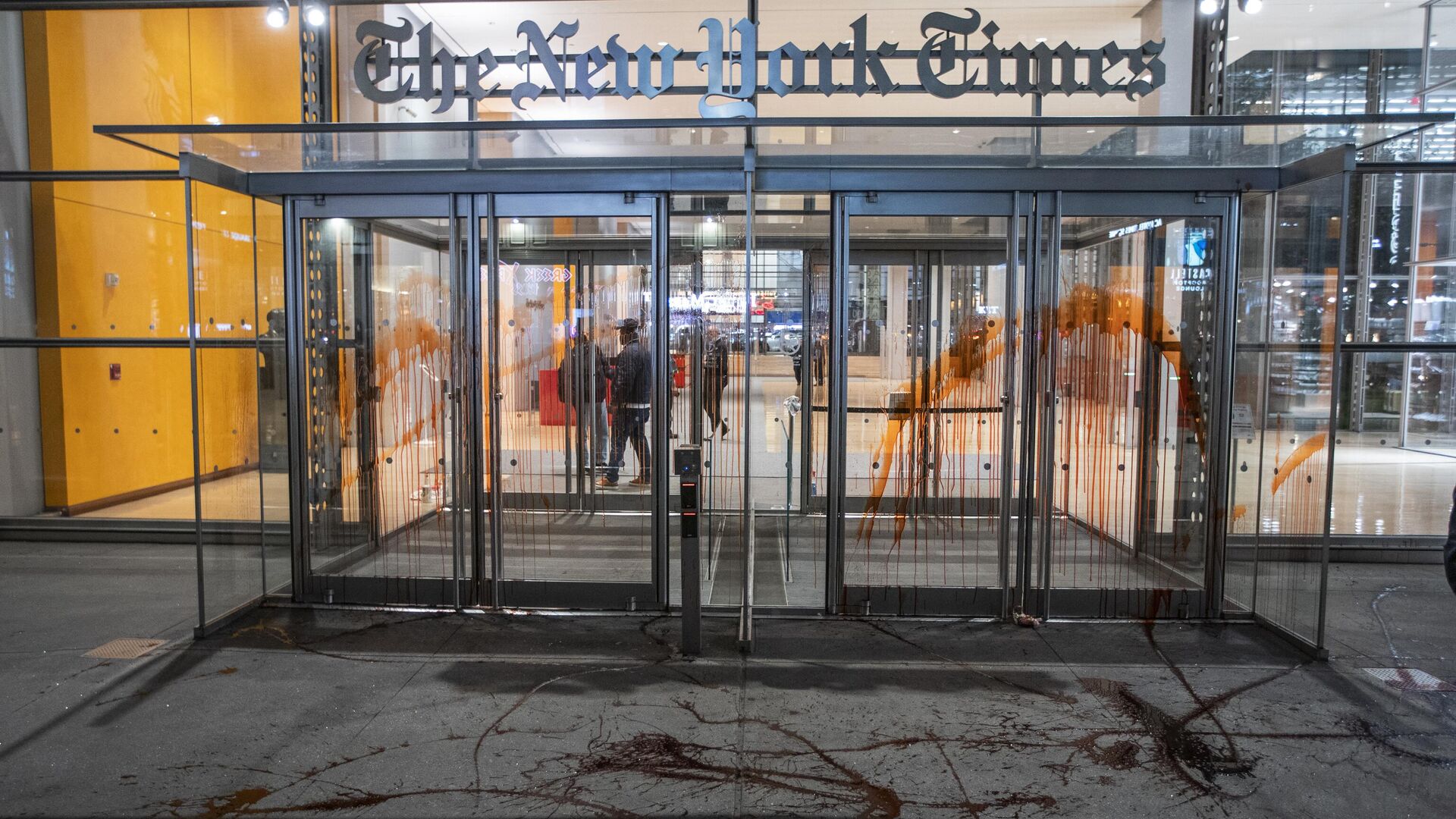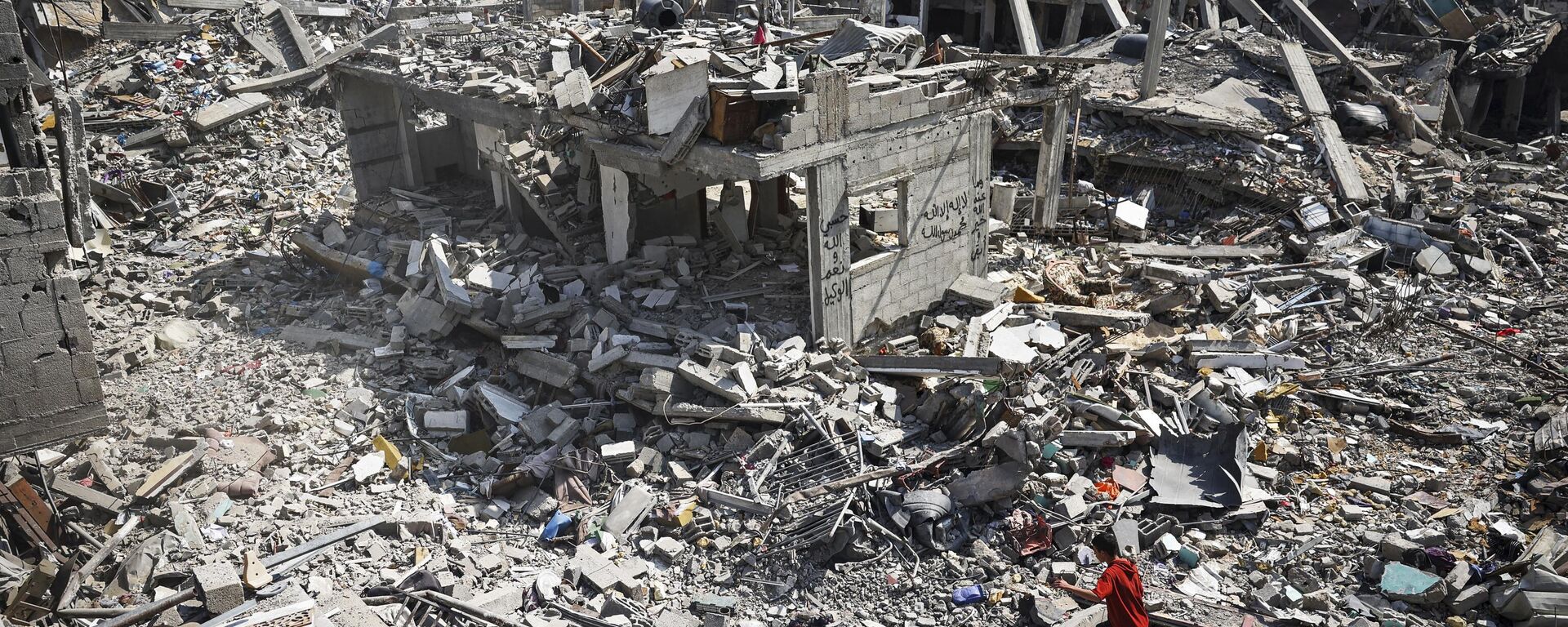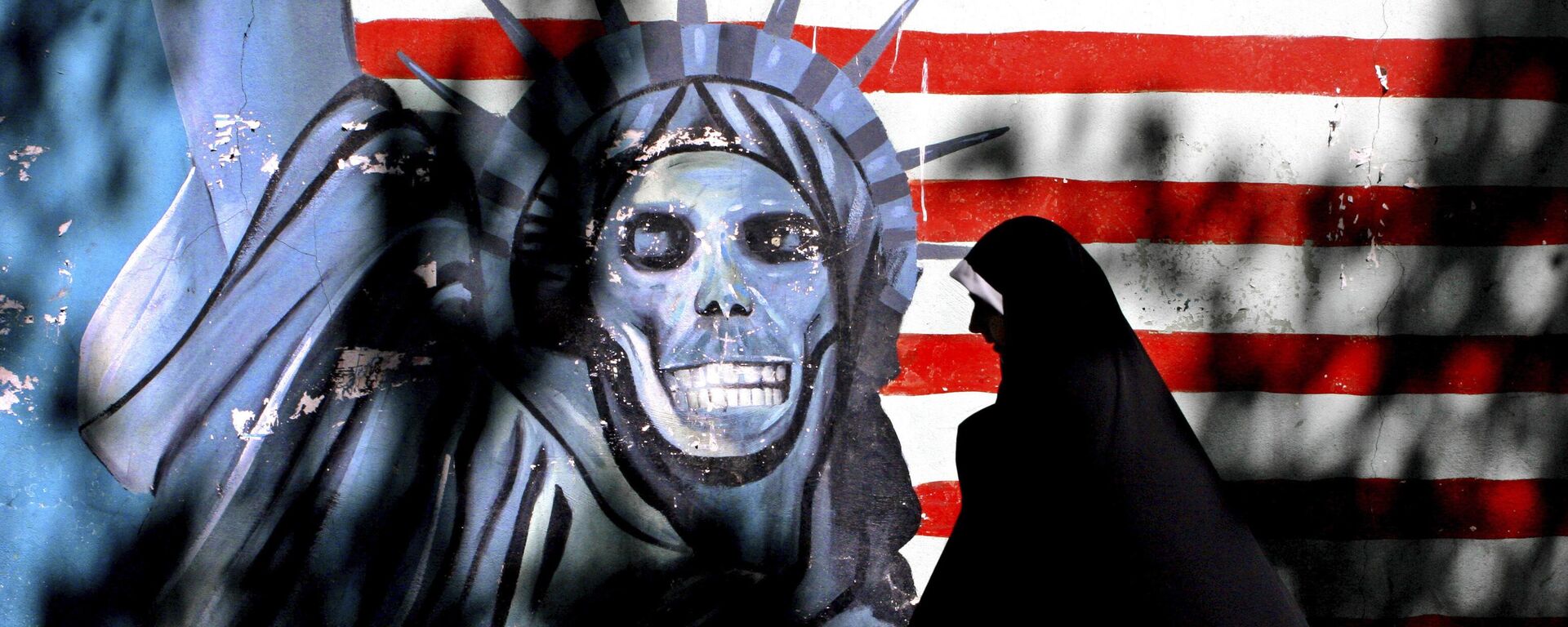https://sputnikglobe.com/20240516/ny-times-blames-us-congress-funding-delays-for-ukraines-battlefield-struggles-1118464243.html
NY Times Admits Russian Success on Battlefield, Blames Congress Funding Delays
NY Times Admits Russian Success on Battlefield, Blames Congress Funding Delays
Sputnik International
The New York Times published an article this week acknowledging Russia’s upper hand in the conflict in the Donbass, although a convenient excuse was found to explain the struggles of the US-backed Ukrainian regime.
2024-05-16T05:03+0000
2024-05-16T05:03+0000
2024-05-16T05:38+0000
analysis
us
vladimir putin
volodymyr zelensky
russia
ukraine
the new york times
congress
media
us media
https://cdn1.img.sputnikglobe.com/img/07e8/05/10/1118463623_0:160:3072:1888_1920x0_80_0_0_48ef6fab51ec9c1c6e025a8e73663143.jpg
The New York Times published an article this week acknowledging Russia’s upper hand in the conflict in the Donbass, although a convenient excuse was found to explain the struggles of the US-backed Ukrainian regime.“White House Worries Russia’s Momentum Is Changing Trajectory of Ukraine War” read the headline in the Tuesday edition of the controversial US newspaper. The authors identified a number of factors contributing towards Moscow’s recent success, including advances in Russian technology and battlefield tactics. But the article focuses heavily on a delay in the provision of US aid to Kiev while Congress debated the wisdom of doubling down on America’s support for the Zelensky regime.The authors referenced the delay in support from Washington at least five times throughout the short article.“A monthslong debate in Washington about whether to send Ukraine a $61 billion package of arms and ammunition created an opening that Russia has clearly exploited, even though Congress ultimately passed the legislation,” the article reads. The authors also noted the Biden administration’s increasing reliance on the talking point, characterizing Secretary of State Antony Blinken’s comment that “there’s no doubt there’s been a cost” as an “understatement.”The article blames the funding delay for Russia’s “huge artillery advantage,” claiming Ukraine would be able to neutralize Russian airpower if it possessed more anti-aircraft weaponry.However, the authors also conceded that Moscow has refined its strategy over the course of the war, allowing it to bring its “huge military infrastructure” and population advantage to bear. Stephen J. Hadley, a national security advisor under former President George W. Bush, is quoted as recognizing that Russia often “finishes strong” in military conflicts, adapting its tactics along the way.The article also acknowledges Russia’s successful use of electronic warfare to disable drones and artillery provided by the West.Throughout the article, the authors find little room for deep interrogation of the wisdom of the conflict or the US role in perpetuating it.Critics note that the US “newspaper of record” has played an instrumental role in upholding US imperialism, never failing to offer support for any Washington-backed coup or US war. Self-critique simply is not part of The New York Times’ mission statement. To question US foreign policy would be to risk undermining the manufacturing of consent that makes it possible.Palantir CEO Alex Karp summarized the risk thusly, explaining the threat of deep reflection on US global policy represented by ongoing protests in support of Palestine: “We think these things that are happening across college campuses are a sideshow. No, they are the show. If we lose the intellectual debate, you will not be able to deploy any army in the West, ever.”Institutions like The New York Times are part of how elites win the intellectual debate or, preferably, prevent it from taking place. Any suggestion that the United States and its warfighting machine may be wrong, guilty, or even fallible cannot be allowed. People employed in the sacred work of spreading freedom and democracy must never second-guess themselves.
https://sputnikglobe.com/20240417/new-york-times-gaza-war-memo-apologetic-to-israel--report-1117973188.html
https://sputnikglobe.com/20231228/cause-du-jour-to-yesterdays-news-western-medias-evolving-2023-coverage-on-ukraine-1115862086.html
https://sputnikglobe.com/20240515/conflict-at-home-and-abroad-as-clock-ticks-down-on-us-empire-1118441105.html
russia
ukraine
Sputnik International
feedback@sputniknews.com
+74956456601
MIA „Rossiya Segodnya“
2024
John Miles
https://cdn1.img.sputnikglobe.com/img/07e8/01/19/1116388787_0:0:1316:1316_100x100_80_0_0_77e70d36afd983012b1c5d38ddb84156.jpg
John Miles
https://cdn1.img.sputnikglobe.com/img/07e8/01/19/1116388787_0:0:1316:1316_100x100_80_0_0_77e70d36afd983012b1c5d38ddb84156.jpg
News
en_EN
Sputnik International
feedback@sputniknews.com
+74956456601
MIA „Rossiya Segodnya“
Sputnik International
feedback@sputniknews.com
+74956456601
MIA „Rossiya Segodnya“
John Miles
https://cdn1.img.sputnikglobe.com/img/07e8/01/19/1116388787_0:0:1316:1316_100x100_80_0_0_77e70d36afd983012b1c5d38ddb84156.jpg
ukraine war ny times, new york times russia, new york times propaganda, new york times us imperialism, new york times ukraine funding delay, new york times us congress ukraine funding, new york times russia winning war in ukraine, new york times putin villification
ukraine war ny times, new york times russia, new york times propaganda, new york times us imperialism, new york times ukraine funding delay, new york times us congress ukraine funding, new york times russia winning war in ukraine, new york times putin villification
NY Times Admits Russian Success on Battlefield, Blames Congress Funding Delays
05:03 GMT 16.05.2024 (Updated: 05:38 GMT 16.05.2024) Throughout the article, the authors find little room for deep interrogation of the wisdom of the conflict or the US role in perpetuating it.
The New York Times published an article this week acknowledging Russia’s upper hand in the conflict in the Donbass, although a convenient excuse was found to explain the struggles of the US-backed Ukrainian regime.
“White House Worries Russia’s Momentum Is Changing Trajectory of Ukraine War” read the headline in the Tuesday edition of
the controversial US newspaper. The authors identified a number of factors contributing towards Moscow’s recent success, including advances in Russian technology and battlefield tactics. But the article focuses heavily on a delay in the provision of US aid to Kiev while Congress debated the wisdom of doubling down on America’s support for the Zelensky regime.
The authors referenced the delay in support from Washington at least five times throughout the short article.
“A monthslong debate in Washington about whether to send Ukraine a $61 billion package of arms and ammunition created an opening that Russia has clearly exploited, even though Congress ultimately passed the legislation,” the article reads. The authors also noted the Biden administration’s increasing reliance on the talking point, characterizing Secretary of State Antony Blinken’s comment that “there’s no doubt there’s been a cost” as an “understatement.”
The article blames the funding delay for Russia’s “huge artillery advantage,” claiming Ukraine would be able to neutralize Russian airpower if it possessed more anti-aircraft weaponry.
However, the authors also conceded that Moscow has refined its strategy over the course of the war, allowing it to bring its “huge military infrastructure” and population advantage to bear. Stephen J. Hadley, a national security advisor under former President George W. Bush, is quoted as recognizing that Russia often “finishes strong” in military conflicts, adapting its tactics along the way.
The article also acknowledges Russia’s successful use of electronic warfare to disable drones and artillery provided by the West.
“In some cases, Russia has successfully deceived GPS receivers, throwing off the targeting of Ukrainian arms, including a variety of missiles shot from HIMARS launchers, which Mr. Biden began providing to Ukraine last year,” the authors write.

28 December 2023, 23:37 GMT
Throughout the article, the authors find little room for deep interrogation of the wisdom of the conflict or the US role in perpetuating it.
Critics note that the US “newspaper of record” has played
an instrumental role in upholding US imperialism, never failing to offer support for any Washington-backed coup or US war. Self-critique simply is not part of
The New York Times’ mission statement.
To question US foreign policy would be to risk undermining the manufacturing of consent that makes it possible.Palantir CEO Alex Karp
summarized the risk thusly, explaining the threat of deep reflection on US global policy represented by ongoing protests in support of Palestine: “We think these things that are happening across college campuses are a sideshow. No, they
are the show.
If we lose the intellectual debate, you will not be able to deploy any army in the West, ever.”Institutions like The New York Times are part of how elites win the intellectual debate or, preferably, prevent it from taking place. Any suggestion that the United States and its warfighting machine may be wrong, guilty, or even fallible cannot be allowed. People employed in the sacred work of spreading freedom and democracy must never second-guess themselves.






